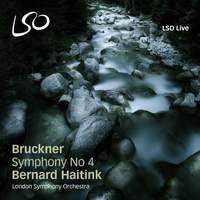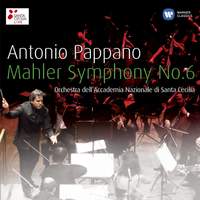Recording of the Week,
Bruckner and Mahler from Haitink and Pappano
For enthusiasts of late Romantic music, there are two exciting new discs to tell you about this week. First up is the latest offering from LSO Live: Bernard Haitink conducting Bruckner’s Fourth Symphony. Haitink has always been very highly regarded for his interpretations of Bruckner, and so it’s a delight that this new disc has come along, especially as most of his earlier recordings with the Royal Concertgebouw and the Vienna Philharmonic are currently deleted from the catalogue.

Although one might initially ask what a new recording could possibly add to the classic recordings by – amongst others – Böhm, Wand, Karajan, and indeed Haitink himself, such questions are immediately answered by the resplendent horn playing of David Pyatt, set against a wonderfully shimmering string background, played truly ppp as marked. Indeed, the horns are magnificent throughout this recording: just listen to their reprise of the opening motif at the very end of the first movement, or their hunting calls in the third movement. Haitink’s tempos, even at their broadest, are never stodgy, and he provides a masterclass in how to achieve a weighty sound without ever allowing the texture to become muddy.
It’s not all about the brass, though: the strings in the second movement are full of warmth, and there is some very fine woodwind playing. On the LSO’s blog, principal flautist Gareth Davies talked about the rehearsals for this piece, where Haitink managed to change the sound of the entire orchestra in an instant with just the tiniest hand gesture, and this is very much in evidence here; this sounds like a completely different orchestra to the one playing for Gergiev’s recording of Mahler’s Ninth that I wrote about back in September. This is in no way a criticism; quite the reverse, in fact, as it speaks volumes for the quality of the orchestra that they can respond to a conductor’s wishes like that.

Speaking of Mahler, the other disc I want to tell you about is a new recording of his sixth symphony, conducted by Antonio Pappano, and performed by the Orchestra dell’Accademia Nazionale di Santa Cecilia. Something that this piece and the Bruckner have in common is that they both pose challenges for the conductor in terms of how to pace the enormously long movements. As Pappano himself says:
“I think in every symphony of Mahler, it doesn't matter how much energy a conductor has, and the musicians, by the time you get to the last movement, you feel like you've got those last hundred metres to go on Everest, and how do you reach there without having a heart attack!”
For my money, Pappano judges everything just right, from the chugging pulse of the cellos and basses at the very opening of the symphony, to the subtle rubato employed throughout the Andante. It is in the finale, though, where Pappano’s experience in the opera house is most evident, as he handles the overall structure impeccably, with the dramatic build-up to each of the two climactic hammer blows of fate being perfectly prepared (Mahler originally considered having a third blow towards the end of the movement, but Pappano respects Mahler’s final wishes and sticks to just two). Incidentally, the sound of the hammer itself is one of the very best I’ve heard on disc. Mahler asks for a ‘short, powerful, but dull, resonant blow of a non-metallic character, like an axe blow’. It’s tricky to get something of the required power that sounds distinct enough from just a loud bang on a bass drum, but Pappano achieves this quite splendidly; you really feel the full force of the blow!
If you’re the sort of person (as I am) who has strong views on the ordering of the middle movements of this symphony, then you may be slightly disappointed to discover that Pappano places the Scherzo second and the Andante third, rather than the other way round. Although Mahler originally intended the order to be Scherzo then Andante whilst he was composing the symphony, he changed his mind before the first performance, and only ever conducted the piece with the ordering of Andante then Scherzo. However, this is a relatively minor issue when the performance is as good as this one, and shouldn’t be a reason to spoil your enjoyment of the disc. Pappano has at his disposal a first-class orchestra, and while the strings maybe don’t have quite the depth and warmth that the LSO provide for Haitink, they make up for it with a flair and passion that rivals any other recording I’ve heard.
This is Pappano’s first Mahler symphony on disc, and on the strength of this release I very much hope that there will be more to come!
Sound samples as usual available via the links below. Enjoy!
London Symphony Orchestra, Bernard Haitink
Available Formats: MP3, FLAC, Hi-Res FLAC
Orchestra dell' Accademia Nazionale di Santa Cecilia, Roma, Antonio Pappano
Available Formats: MP3, FLAC




